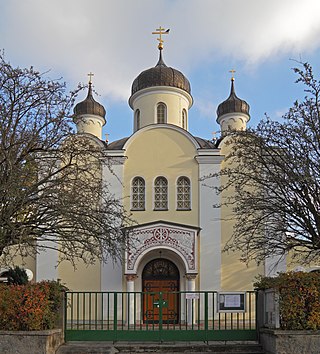
The Russian Orthodox Church, alternatively legally known as the Moscow Patriarchate, is an autocephalous Eastern Orthodox Christian church. It has 194 dioceses inside Russia. The primate of the ROC is the Patriarch of Moscow and all Rus'.

Russian Orthodoxy is the body of several churches within the larger communion of Eastern Orthodox Christianity, whose liturgy is or was traditionally conducted in Church Slavonic language. Most Churches of the Russian Orthodox tradition are part of the Eastern Orthodox Church.

The Ukrainian Orthodox Church (UOC), commonly referred to by the exonym Ukrainian Orthodox Church of the Moscow Patriarchate (UOC-MP), is an Eastern Orthodox church in Ukraine.
The culture of Azerbaijan combines a diverse and heterogeneous set of elements which developed under the influence of Iranic, Turkic and Caucasian cultures. Azerbaijani culture includes its distinct cuisine, literature, folk art, and music.

Islam is the majority religion in Azerbaijan, but the country is considered to be the most secular in the Muslim world. Estimates include 97.3% and 99.2% of the population identifying as Muslim. Of these, a majority belong to the Shia branch (55-65%), while a significant minority (35-45%) are Sunni. Traditionally, the differences between these two branches of Islam have not been sharply defined in Azerbaijan.

Christianity in Azerbaijan is a minority religion. Christians who estimated between 280,000 and 450,000 (3.1%–4.8%) are mostly Russian and Georgian Orthodox. There is also a small Protestant Christian community which mostly came from Muslim backgrounds. Due to the very hostile relations between Azerbaijan and Armenia, Armenian Christians have practically entirely fled the country, and so the Christians in Azerbaijan are members of various other groups, mostly Russians.

Holy Myrrhbearers Cathedral is a Russian Orthodox cathedral in Baku, Azerbaijan. The church is dedicated to the Holy Myrrhbearers, who are commemorated on the second Sunday after Pascha (Easter).

Christianity is the predominant religion in Georgia. The wide variety of peoples inhabiting Georgia has meant a correspondingly rich array of active religions in the country.

In 2020, 85.84% of the population in Georgia adhered to Christianity, 11% were Muslim, 0.1% were Jewish, 0.04% were Baha'i and 3% had no religious beliefs. Other religious groups include Jehovah's Witnesses and Yazidis. Orthodox churches serving other non-Georgian ethnic groups, such as Russians and Greeks, are subordinate to the Georgian Orthodox Church.

Kiş is a village and municipality in the Shaki Rayon of Azerbaijan. It is located approximately 5 km north of Shaki. It has a population of 6,244.
The Church of Albania or the Albanian Apostolic Church was an ancient, briefly autocephalous church established in the 5th century. In 705, It fell under the religious jurisdiction of the Armenian Apostolic Church as the Catholicosate of Aghvank centered in Caucasian Albania, a region spanning present-day northern Azerbaijan and southern Dagestan.

Church of Michael the Archangel or Flotskaya is a Russian Orthodox church in central Baku, Azerbaijan, on Zargarpalan street. The church is dedicated to St. Michael. The church is serviced by Archpriest Mefodi Efendiyev, three priests and one deacon.

Diocese of Baku and Azerbaijan is a diocese of the Russian Orthodox Church in Azerbaijan. Majority of its members are ethnic Russians of Azerbaijan. Entire territory of Azerbaijan is under ecclesiastical jurisdiction of the Russian Orthodox Eparchy of Baku and Azerbaijan, centered in the Holy Myrrhbearers Cathedral in Baku. The Church of Michael Archangel also exist in Baku.

The Diocese of Berlin and Germany is an eparchy of the Russian Orthodox Church (ROC), Moscow Patriarchate, uniting parishes on the territory of Germany. It was established in 1921. The eparchy is divided into five deaneries: Northern, Eastern, Bavarian and Hessen, Southern, and Western.

Heydar Mosque is an Azerbaijani mosque named after Heydar Aliyev, in the Binəqədi raion of Baku. It officially opened on 26 December 2014.

The Diocese of the Philippines and Vietnam is a diocese of the Patriarchate of Moscow created on 26 February 2019, directly under the Patriarchal Exarchate in Southeast Asia (PESEA).
On 15 October 2018, the Russian Orthodox Church broke the communion with the Ecumenical Patriarchate because of a dispute concerning the canonical jurisdiction over Ukraine. This led to the 2018 Moscow–Constantinople schism. Numerous Orthodox churches took position concerning the dispute over the canonical jurisdiction over Ukraine, whether before or after this schism.
The Patriarchal Exarchate in Western Europe is an exarchate created by the Russian Orthodox Church (ROC) on 28 December 2018.

The Spanish-Portuguese diocese (SPD) or Diocese of Madrid and Lisbon is a diocese of the Russian Orthodox Church (ROC) created on 28 December 2018. The diocese is part of the Patriarchal Exarchate in Western Europe.
The Patriarchal Exarchate in South-East Asia is an exarchate created by the Russian Orthodox Church (ROC) on 28 December 2018.















